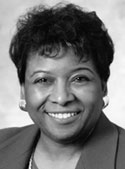Making Marriage Work 101
Dr. Lorraine Blackman takes
matrimony to a college level

There is a marriage movement going on in America. According to
authors Linda Waite and Maggie Gallagher of "The Case for
Marriage," married people live longer, have better health, earn
more money, accumulate more wealth, feel more fulfilled in their
lives, enjoy more satisfying sexual relations and have happier,
more successful children. Their statistics reveal that violence is
less likely in married households, and divorce reduces male life
expectancy to the equivalent of a pack-a-day cigarette habit.
But in the Black community very little is being done. Final Call
staff writer Nisa Islam Muhammad went one on one with Dr. Lorraine
Blackman of Indiana University�s School of Social Work, who
developed the first marriage education curriculum designed for
Black couples. The interview occurred during the recent "2001
Smart Marriages Conference."
Final Call (FC): What is the marriage movement and is it
in the Black community?
Lorraine Blackman (LB): The marriage movement is comprised of
individuals and organizations who really want to promote marriage as
the normalcy of relationships in America. I know that it�s not
being preached about in our churches, it�s not being taught in the
spaces that we own, and, as you can see at this conference, there
are not many of us here.
FC: Why isn�t the marriage movement in the Black
community?
LB: There is so much regard for women who have done it alone.
So many peoples�mothers and grandmothers�have reared children alone
that we�re not ready to say that marriage is the best way or the
only way to live. A friend of mine said, "I�m skeptical of the
marriage movement because it�s so white."
We�ve had white people come into our communities for so long
telling us how we should live that we are still skeptical of them
now telling us how to live. But we�re not telling our people how to
live or helping them to see the bridges that have brought us over.
So if white people can�t tell us how to live and we�re not going to
teach each other, then we�re in serious, serious trouble, which is
where we are.
FC: Describe your program?
LB: The African American Family Life Education Program
started as a research project for my dissertation on why our
children were acting so crazy. When I studied the issue, I found
out that something had come apart in our community. I began my
research to see what happened. Following the data has led me to the
fact that Black parents couldn�t pull together to raise their
children. I looked at 51 different models of marriage enrichment
and found that none of them addressed the specific issues that were
found in our relationships that were blowing us apart. It led me to
develop a marriage and parenting curriculum customized for African
Americans.
FC: What does your program accomplish?
LB: Our people live in a different context and reality than
other couples. We have to figure out what a good relationship is
supposed to look like because many of us didn�t grow up in them.
That�s what we�re trying to get at in those first seven weeks.
They have to come together and figure out who they are as Black
people and how to build a satisfying relationship, not just a
stable one, not just staying together, not just having a good enough
relationship, but how to have a satisfying and lasting relationship.
FC: How does the program work?
LB: Dinner is served together as a family and the students in
the School of Social Work provide structured activities for the
children in another room. The adults come to class with me. The
research said that Black men wouldn�t talk in a setting that
required lots of self-disclosure. I can hardly get them to hush. I
don�t force them to talk. They�re free to jump in wherever they
like, and they jump in. I don�t allow them to argue, to disrespect
each other or air their dirty laundry in class. They have
structured activities that they do at home. That allows them to
talk to each other and spend quality time together.
One of the homework assignments is to write their own vows for
our commitment ceremony. They learn what kind of commitments they
want to make toward each other. They have the option of getting
married at that ceremony. But usually the brothers are not willing
to be pressured like that. They want to get married on their own
clock. Several of our couples were already married.
We have a wonderful ceremony with African drumming, dancing and
African decor to celebrate the happiness. Two or three weeks before
the ceremony they receive invitations to send out so this becomes a
community celebration. They can invite their spiritual leader to
come and stand with them. They get their own small wedding cake.
FC: How can we duplicate this?
LB: We�ve tested the curriculum and I�m ready to share it
with other people and teach them how to duplicate this. The issues
of marriage are not being taught in our community like they need to
be. It may be that the Nation of Islam is our answer to this
problem.
(Dr. Blackman will join other marriage experts
in Washington, DC, November 3, for "Reviving Marriage in the Black
Community". For more information call 202-215-7768.) |

![]()